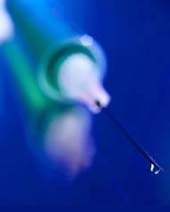
Vaccinations may increase death toll.
Inadequate vaccines can the encourage emergence of nastier bugs, placing the unprotected at risk, a new mathematical model shows. The effect could undermine future vaccination programmes.
Many vaccines save people from dying of a disease, but do not stop them carrying and transmitting it. Over a few decades this may cause more virulent strains to evolve, predict Andrew Read and his colleagues of the University of Edinburgh, UK 1

Satellites have detected the shifting forces that weave the Northern Lights.
A group of four spacecraft has given scientists their first glimpse of the immense electrical circuit above the Earth that creates the shimmering veil of the aurora borealis, or Northern Lights 1 .
In January 2001 the four satellites of the European Space Agency’s Cluster mission encountered a beam of electrons moving away from the Earth near the North Pole. The beam was on the outwa

American Society for Cell Biology Meeting, Washington, December 2001
Stem cells’ fates are a multiple choice.
A single stem cell from adult mouse muscle can form enough blood cells to save another animal’s life – and still switch back to making brawn, researchers announced at the Washington meeting of the American Society for Cell Biology this week.
Stem cells found in mashed up muscle can migrate into the bone marrow and make blood cells 1 . Muscle

American Geophysical Society Meeting, San Francisco, December 2001
The Sun’s violent outbursts have deep and twisted origins.
The Sun’s violent eruptions of material and magnetic energy have deep and twisted origins, researchers told this week’s American Geophysical Union Meeting in San Francisco, California.
These coronal mass ejections (CMEs) cause the aurora, seen at the Earth’s poles, and can knock out spacecraft. An understanding of what drives CMEs may one da

Mars’ polar ice caps are slowly melting.
The martian ice caps are shrinking. As they are made mostly of frozen carbon dioxide, this evaporation could trigger an increase in Mars’ own greenhouse effect.
Images from the Mars Global Surveyor spacecraft show that ice ridges and escarpments have retreated over the past two years or so. The orbiting probe has also captured the ice thickening and thinning with the passing seasons.
The reason for the change is not yet clea

In any computer’s hard drive, magnetic fields spin electrons this way or that. Now physicists have demonstrated that an electric field can do the same when applied to electrons in semiconductors. And unlike the older magnetic approach, their new device, called a spin gate, is capable of easily imparting a range of spin values. The team’s results, described in a report appearing today in the journal Nature, may one day help to scientists realize the ideal of spintronics—quantum computing based on ele

At the Berlin synchrotron radiation source BESSY II, the largest magnetic anisotropy of a single molecule ever measured experimentally has been determined. The larger this anisotropy is, the better a…

LSU quantum researchers uncover hidden quantum behaviors within classical light, which could make quantum technologies robust. Understanding the boundary between classical and quantum physics has long been a central question…

One of the biggest mysteries in science – dark energy – doesn’t actually exist, according to researchers looking to solve the riddle of how the Universe is expanding. For the…

A team led by plant biotechnologist Prof Markus Schwarzländer from the University of Münster and biochemist Prof Bruce Morgan from Saarland University has developed new biosensors with which the ratio…

How deubiquitinases USP53 and USP54 cleave long polyubiquitin chains and how the former is linked to liver disease in children. Deubiquitinases (DUBs) are enzymes used by cells to trim protein…

Conceptual blueprint to analyze experimental catalyst data. Machine learning (ML) models have recently become popular in the field of heterogeneous catalyst design. The inherent complexity of the interactions between catalyst…

How simulations help manufacturing of modern displays. Modern materials must be recyclable and sustainable. Consumer electronics is no exception, with organic light-emitting diodes (OLEDs) taking over modern televisions and portable…

“Neurons that fire together, wire together” describes the neural plasticity seen in human brains, but neurons grown in a dish don’t seem to follow these rules. Neurons that are cultured…

The quest for sustainable energy solutions has been a major focus of scientific research for decades. Solar energy, a clean and renewable source, has emerged as a promising alternative to…

Pacific Northwest National Laboratory to contribute leadership to national effort in microelectronics design and development. Microelectronics run the modern world. Staying ahead of the development curve requires an investment that…

With a processing speed a billion times faster than nature, chip-based laser neuron could help advance AI tasks such as pattern recognition and sequence prediction. Researchers have developed a laser-based…

New technology could remotely identify various types of plastics, offering a valuable tool for future monitoring and analysis of oceanic plastic pollution. Researchers have developed a new hyperspectral Raman imaging…